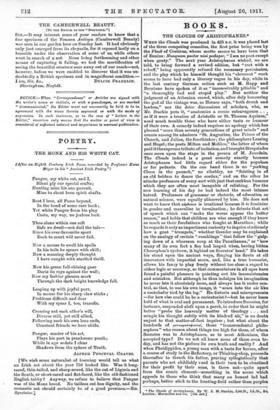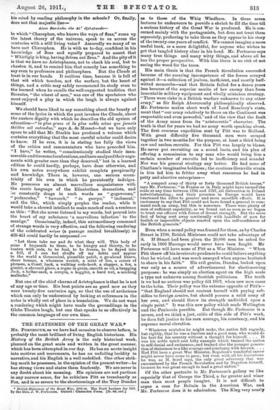BOOKS.
THE CLOUDS OF ARISTOPHANES.*
WHEN the Clouds was produced in 423 Re. it was placed last of the three competing comedies, the first prize being won by the Flask of Cratinus, whose motto seems to have been that of F.nnius: Nun quain peeler nisi podager, " I am no poet except when gouty." The next year Aristophanes wished, we are told, to bring forward a revised edition, but "met with a rebuff," being apparently refused the necessary permission, and the play which ho himself thought his " cleverest " work seems to have had only a literary vogue in his day, while in the last century German critics such as M. Rapp and Brentano have spoken of it as " inconceivably pitiable " and "a thoroughly bad and stupid play." But neither the judgment of an Athenian crowd, which, after duly honouring the god of the vintage was, as Horace says, "both drunk and lawless," nor the drier discussions of scholars, who, as Mr. Starkie puts it, "anatomize a comic extravaganza. . . . as if it were a treatise of Aristotle or St. Thomas Aquinas,' need much trouble those who have either taste or humour of their own. A comedy indeed requires no apology which has pleased "more than seventy generations of great minds" and counts among its admirers "St. Augustine, the Prince of the Church, and Julian, the freethinker; the philosophers Leasing and Hegel; the poets Milton and Moliere," the latter of whom paid it the supreme tribute of imitation, and brought Strepsiades once more upon the stage in the person of M. Jourdain. The Clouds indeed is a great comedy exactly because Aristophanes had little regard either for the populace or for pedants. On the one hand there is no "yerking Cleon in the paunch," no ribaldry, no "foisting in of an old beldam to dance the cordax," and on the other he attacks professors of every sort with just that reckless humour which they are often most incapable of relishing. For the new learning of his day he had indeed the most intense hatred. Professors of grammar or rhetoric, of education or natural science, were equally abhorred by him. He does not want to know that gaialovos is irrational because it is feminine in gender and masculine in termination ; he detests that art I of speech which can " make the worse appear the better reason," and holds that children are wise enough if they know as much as their forefathers who fought at Marathon; while be regards it only as impertinent curiosity to inquire studiously how a gnat " trumpets," whether thunder may be explained on the analogy of certain "rumblings" that follow the "wip- ing down of a whoreson soup at the Panathenwa," or "how many of its own feet a flea had leaped when, having bitten Chrephon's eyebrow, it lighted on Socrates' head." He takes his stand upon the ancient ways, flinging his flouts at all innovators with impartial scorn, and, like a true humorist, allows his fancy to play freely without too close a regard to either logic or accuracy, so that commentators in all ages have found a painful pleasure in pointing out his inconsistencies and mistakes. But although he thus indulges his imagination he never lets it absolutely loose, and always has it under con- trol, so that, to use his own image, it " soars into the air like a cockchafer tied by the leg." He distorts and misrepresents —for how else could he be a caricaturist?—but he never loses hold of what is real and permanent. To introduce Socrates, for instance, suspended aloft upon a perch, in order that he might better "probe the heavenly matter of theology . . . and mingle his thought subtly with its kindred air," is no doubt unjust to that matter-of-fact inquirer ; but what about the hundreds of /Ayr o croa no-r at, those "transcendental philo- sophers" who reason about things too high for them, of whom Socrates was to Aristophanes, as to most Athenians, the accepted type ? Do we not all know some of them even to- day, and has not the picture its own truth and reality ? And when Pheidippides, a young man with a taste for horses, after a course of study in the Reflectory, or Thinking-shop, proceeds thereafter to thrash his father, proving syllogistically that parents who act childishly reed in their turn to be chastised for their profit by their sons, is there not—quite apart from the comic element—something in the scene which appeals to those who think that many an honest lad had perhaps, better stick to the hunting-field rather than perplex
The Clouds of Aristophanes. By W. J. M. Starkie, Litt.D., LL.D., dta. London: Macmillan and Co. [12s. net.]
his mind by reading philosophy in the schools P Or, finally, does not that majestic line—, Airos OCIAtAe6es •AP teAnhettet4t--
in which " Chzerephon, who knows the ways of fleas," sums up the latest theory of the universe, speak to us across the centuries with a still living voice P Assuredly we many of us have met Chterephon. He is with us to-day, confident in his knowledge of fleas and equally prepared to assert that " Whirligig is king, having driven out Zeus." And the pity of it is that we have no Aristophanes, not to check his zeal, but to chasten it, and to remind him that comedy has something to say even to professors and philosophers. But the Clouds at least is in our hands. It outlives time, because it is full of that wit which touches, not the surface, but the heart of things, and a critic may safely recommend its study even to the learned when he recalls the well-supported tradition that Socrates, "the wisest of men," was one of the spectators who most enjoyed a play in which the laugh is always against himself.
We should have liked to say something about the beauty of some of the lyrics in which the poet invokes the Clouds, about the austere dignity with which he describes the old system of education—" la plus grave et la plus noble scene que jamais thgdtre ait entendue," says A. de Musset—but we have only space to add that Mr. Starkie has produced a volume which contains everything that the most careful scholar could desire to know. If he errs, it is in stating too fully the views of the critics and commentators who have preceded him. "I have," he write; "conscientiously studied their innu- merable and tiresome lucubrations, and have analysed their argu- ments with greater care than they deserved," but in a learned edition he' could hardly, perhaps, have done otherwise, and his own notes everywhere exhibit complete perspicacity and knowledge. There is, however, one serious eccen- tricity of his own in which be persistently indulges. He possesses an almost marvellous acquaintance with the comic language of the Elizabethan dramatists, and :re constantly drags in such words as " gogswouns," " pedascules," " bawcock," " in guerpo," " inchmeal," and the like, which simply perplex the reader, while it would take a shrewd intellect to make much of such a sentence as this : "But she never listened to my words, but poured into the heart of my substance ' a marvellous infection' to the manage." Occasionally, indeed, this extraordinary command of strange words is very effective, and the following rendering of the celebrated mai), os (a passage recited breathlessly) in 439-451 could hardly be surpassed :- " Let them take me and do what they will. This body of mine I bequeath to them, to be hungry and thirsty, to be beaten with rods, to be foul, to be frozen, to be flayed into a fell, if I can but shuffle off my debts and appear to the world a thrasonical, plausible patch, a go-ahead knave, sheer bounce, a whoreson wretch, a mint of lies, a coiner of phrases, a Court hack, a walking code-book, a clapper, a fox, a gimlet, a cheveril glove, a rogue in grain, smooth as oil, a bragging Jack, a halter-sack, a scroyle, a boggier, a hard nut, a miching mallecho."
But one of the chief charms of Aristophanes is that he is not of any age or time. His best points are as good now as they were twenty-five centuries ago, so that the use of archaisms which can only be understood by looking at references in the notes is wholly out of place in a translation. We do not want a rendering which might have made the groundlings in the Globe Theatre laugh, but one that speaks to us effectively in the common language of our own time.



































 Previous page
Previous page